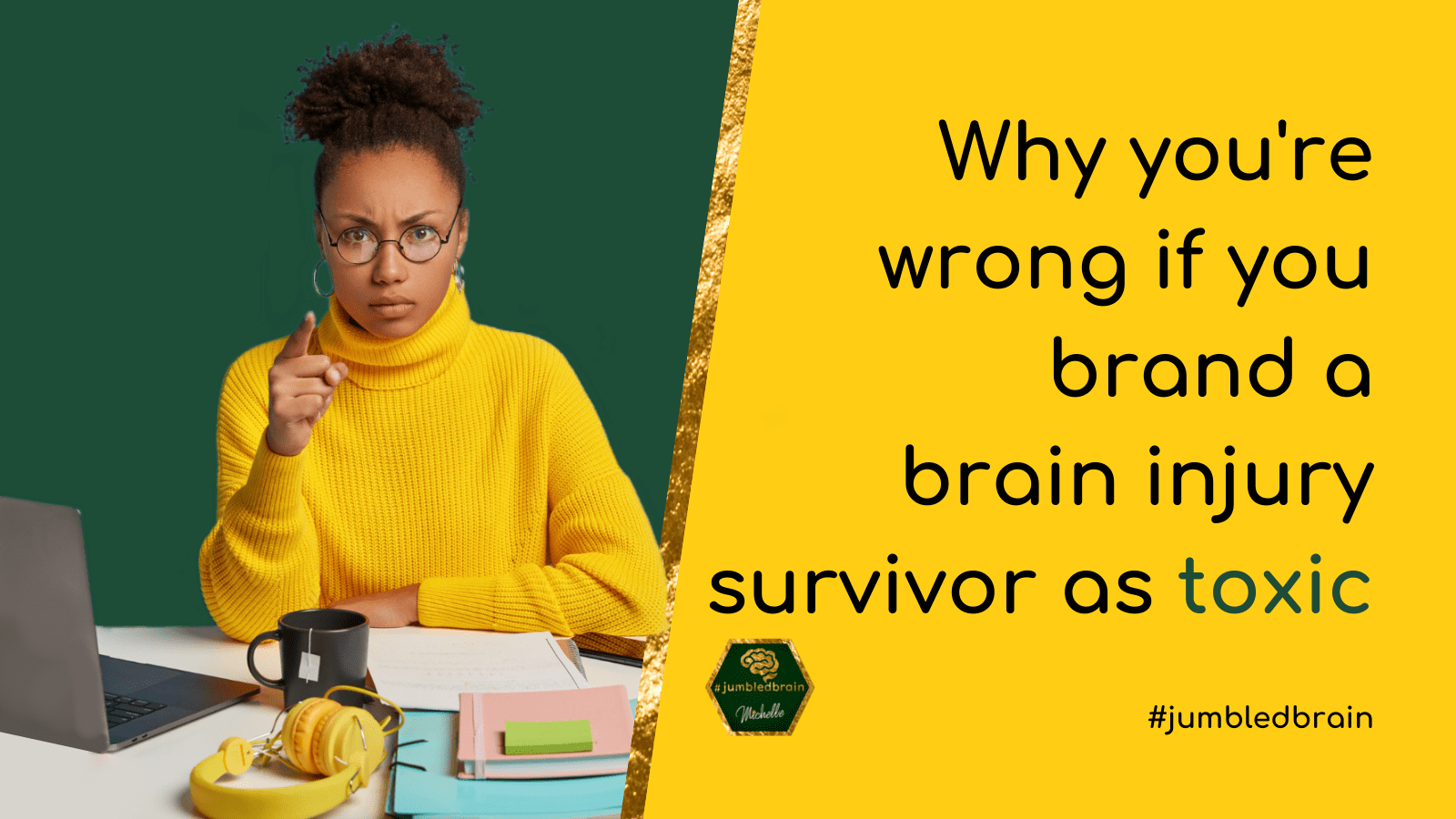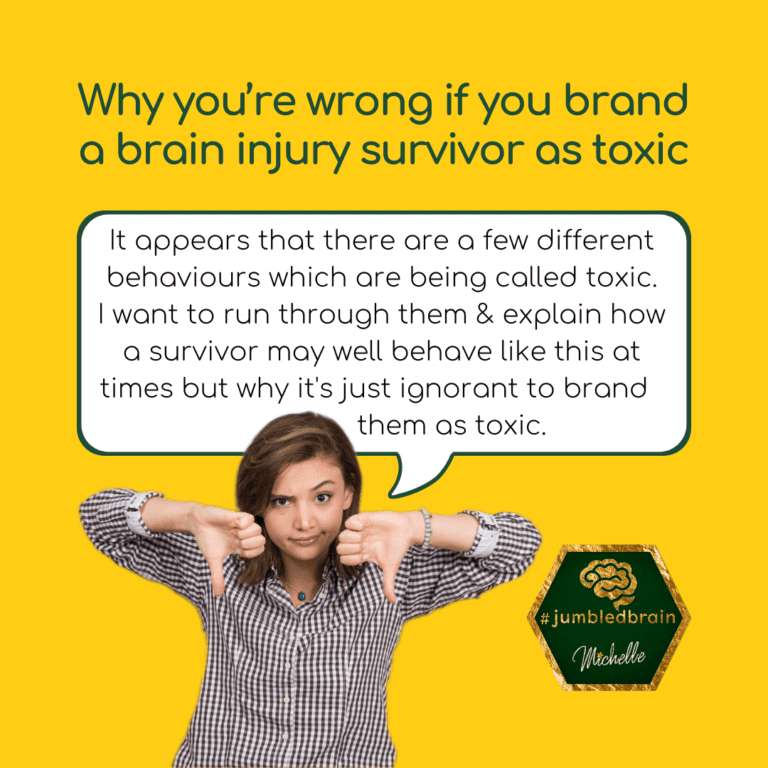
Social media is full of ideas and there are a lot of people who try to remind others to look after themselves. That is an important message as we can’t pour from an empty cup, i.e. if we have used up all our energy and not replenished it we have nothing else to give. I think we all can appreciate this sentiment. But what I get more concerned about is when I see people throw around words which have become the latest trend to use that encourage people to brand others as something rather than try to understand them. The word I’m particularly concerned about is toxic.
How easy it is for the brain injury survivor to be unfairly labelled as toxic.
I know one former friend stopped talking to me because she “needed to surround herself with uplifting people who reflect her kind of energy.” This happened within the first year of my recovery process. If you have been following me for a while you will know that I was also grieving the death of my mum and trying to help my dad cope as he declined with Alzheimer’s. I fully admit that I wasn’t much fun at that point in my life and I probably didn’t offer much support with what she was facing at the time as my plate was already over flowing with trauma. Maybe I talked too much about how I felt my life had fallen apart and burdened her too much with it all. This wasn’t someone I saw a lot of so it’s not like she had to hear it every week, and I guess we just weren’t as close as I thought. Honestly I’m fine with us going on our different paths, that’s just life. But what I don’t relish, is the realisation that what she was actually doing was branding me as a form of toxic.

What is a “toxic” person and why a survivor shouldn’t wear this label.
It appears that there are a few different behaviours which are being called toxic. I want to run through them and explain how a survivor may well behave like this at times but why it’s just ignorant to brand them as toxic.
THE CONVERSATIONAL NARCISSIST – Someone who talks about themselves a lot, rarely asks the other person any questions, appearing that they are more interested in themselves and what is going on their life at that time.
WHY THIS DOESN’T MAKE A BRAIN INJURY SURVIVOR “TOXIC” – When you have gone through a major trauma your body and brain go into “fight or flight mode”. You might find that you’re more jumpy than you were before as your system is on constant alert for danger. But also you’re brain is trying to analyse what you have been through, unpicking all the little details in hope that it an find a way it put it right again and keep you safe from it happening again. This is a behaviour I have no doubt that I displayed a lot with my former friend without realising it. I can tell you that this doesn’t mean that I didn’t care about her, just that I thought as we were friends she would be willing to help me through all the thoughts and emotions I was being bombarded with at the time.
THE EMOTIONAL VAMPIRE – Someone who will find a negative angle in most situations. They are often sad and pessimistic which can take the wind out of the other persons sails.
WHY THIS DOESN’T MAKE A BRAIN INJURY SURVIVOR “TOXIC” – Whilst we are still processing the trauma we have been through our brain will continue to look for signs of “danger” in any given situation. It is looking to avoid any more drama, disappointment or heartache as well as physical danger. This is another behaviour I know I was guilty of with my former friend. She had just become an Arbonne consultant which she was doing whilst continuing with her very successful career in another area. I listened to the sales pitch she gave me about why I should sign up as a consultant which the lady who’d signed my friend up chipping in on too. I was worried about investing in something that was designed to make others rich and explained how I thought this was a pyramid scheme. Actually, it’s a multi-level marketing (MLM) business. The only difference between a MLM and a pyramid scheme is an MLM has an actually product to sell. However, they both rely on each new level recruiting new consultants. The higher levels take a percentage of the sales from every consultant they have recruited, so the higher up you are the more money you make. But those at the bottom of the pile often just invest money buying the products and may never make money. So yes, I did rain on her party and she probably didn’t like to way I did it in front of this other lady. But when you are still in “fight or flight mode” from your brain injury it can only be expected that like a cornered animal you will either look for a way out, or will bare your teeth.
THE FIBBER – Someone who regularly embellishes, exaggerates or just claims things that just aren’t true. This is seen as being wrapped up in their own self importance, attention seeking and dishonest.
WHY THIS DOESN’T MAKE A BRAIN INJURY SURVIVOR “TOXIC” – Often brain injury survivors can confabulate, which is where the brain can try to fill in the gaps in our memory with things that didn’t happen or aren’t accurate. (You can read more about these in Confabulation is not lying. False memories due to brain injury.) We genuinely believe these confabulations, so whilst our brains are lying to us, we are not being dishonest when we relay them to other people. We think they are real and the truth. Yes this might be a little wearing for others to try to unpick what is accurate, but we don’t mean to cause any harm.
THE CONTROL FREAK – They have lots of rules to follow for different situations, such as the environment you meet in (lighting, background noise etc.) Plus when they disagree with you about something they won’t stop trying to convince you that they are right.
WHY THIS DOESN’T MAKE A BRAIN INJURY SURVIVOR “TOXIC” – Many of the rules a brain injury survivor is trying to impose on a situation, are actually their coping mechanisms. They may suffer with noise and light sensitivity and these rules help them to manage their fatigue and avoid additional pain. I have been that party pooper who has begged someone to turn the music down which wasn’t even loud. There can be just a particular vibration or pitch that just overloads the injured brain of a survivor. Think about it, if a wheelchair used said they could only meet somewhere with that’s wheelchair accessible you wouldn’t think they were being controlling, just asking you to make choices which means they can safely join in.
If we disagree with you and won’t let it go, that could be us struggling with our slow processing. Sometimes with the damaged pathways it can take us long to take something in and analyse it properly. That might mean we keep pushing back because it doesn’t sound right to us. We might eventually agree with you once the brain has mulled on it for a while, or we might still not agree with you. A brain injury doesn’t mean we’re stupid or that you know better than us. It could be just that on that occasion you’re wrong and we’re trying to do you a favour. We might have lost the filter that would kick in and tell us to accept that you’re never going to agree and so change the subject. Yes that can make the situation uncomfortable, but in most cases in time we can regain this skill so don’t write us off.
THE DRAMA MAGNET – They are always complaining that something is wrong. Offering advice doesn’t help, and the moment one crisis has been resolved, another comes along.
WHY THIS DOESN’T MAKE A BRAIN INJURY SURVIVOR “TOXIC” – Again this comes back to the trauma a brain injury survivor has been through. Many of the things they are conveying are because their life has been turned upside down. Often it has cost them their career as well as their health, and unfortunately a loss of income effects virtually everything. When in this situation it’s difficult to look ahead and plan so you’re stuck in this moment, scared of what is coming next. Just like it’s not helpful to tell someone with a chronic illness to “just try going vegan”, without understanding their condition, unprofessional advice might not be supportive. We’re not always looking for you to resolve it for us. Talking about our worries can help us process the emotions and we might privately find a way later which is in part thanks to you offering a non-judgemental ear.
Please be careful when using these terms to brand someone as a bad person.
You might not be able to cope with the behaviour that a brain injury survivor has started to display as a result of their injury, and of course your mental health is just as important. If that’s the case I agree that you need to back away until you are in a position to deal with them in a healthy way, or that they have recovered a little more. But please don’t throw around terms like toxic as it’s unhelpful to brand people like this. A brain injury is a disability, but with the right support we still have a lot to offer and shouldn’t be discriminated against.
Other article you may like:
- Why following instructions with a brain injury can be challenging
- When raising awareness becomes TBI victim blaming
- How a sudden brain injury is like entering uncharted waters
- Good days & bad days, but with a brain injury two are never the same
- TBI and PTSD isn’t limited to just war vets, it can happen to anyone
- Why outbursts after a brain injury happen

8 replies on “Why you’re wrong if you brand a brain injury survivor as toxic”
Great info! Thanks for educating the general community! We need more advocates like you in the TBI community☮️🙏🏼
It’s my pleasure Anthony. I hope the more we talk about brain injury, the more we can promote understanding within the general public.
That was great, thank you x
Ah thanks Carol, glad you enjoyed it.
I’m sorry you lost a friend. It seems to be a common thing with those that are chronically ill. I lost friends during the first year because apparently I moaned a lot…well, I’m sorry, but losing the ability to walk and having my life turned upside down gave me enough things to complain about, and I thought my friends were being supportive by listening to me, when instead they were just complaining about my moaning behind my back. A sick person is definitely not toxic, but so many healthy people cannot understand what it’s actually like unless it happens to them.
That’s very unsupportive of those people to be surprised that you needed to express how you where feeling about such a life altering event. They were not good friends.
This is exactly 💯 % part of what I was accused of . Married 27 yrs then divorced .because once your off life support and then home from Physical Rehabilitation there is Nothing wrong with you .
Ive heard it all like everyone has
It’s so hurtful.
I’m sorry Mary. It’s so sad that just because we have survived there is little understanding how this is a life changing injury and we need help adapting, as do our families.